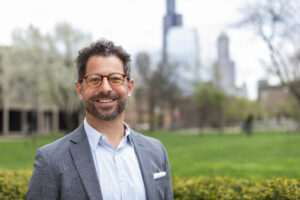The man who inspired the film Hotel Rwanda visited Chicago last week, and his words – about the power of words – inspired some local journalism students.
“I believe in the power of words,” said Paul Rusesabagina. “With words you can save lives, with words you can kill lives.”
This phrase captures in a nutshell his survival method, Rusesabagina said. It was the power of words that allowed him to comfort and protect a crowd of his fellow citizens during the genocide in 1994.
As an employee of a hotel, Rusesabagina sheltered many refugees and protected them from harm.
Words spoken to people in high positions helped save him and the lives of his family during the months of brutal killings of an estimated one million Rwandans of the Tutsi tribe at the hands of a military Hutu tribe.
On his 11th anniversary in exile, Rusesabagina said the two tribes, Hutus and Tutsis, have something in common: “We are the same culture.”
However, he described the tribal relationship as one of master and slave. They would tell if an individual was Tutsi was by measuring his nose, he said. A Tutsi nose was supposed to be longer than a Hutu’s. A Tutsi was also seen as more intelligent, while a Hutu’s role was only to respect the Tutu.
“The Tutsis were created to be leaders, and the Hutus were created to follow order,” he said.
This is the basis, Rusesabagina said, for the tension – and, later, violence – that arose between the two groups.
When the genocide began, Rusesabagina said he was not surprised because three democratic presidents had already been murdered, and it was only a matter of time before chaos and disparity would find its way into the neighborhoods he called home.
When violence did break out, some of those very neighbors found leadership in Rusesabagina. One by one, 26 neighbors ended up at his house. From there, they united at the Diplomat Hotel, where Rusesabagina worked, and he provided shelter for a total of 1,268 Tutsis and Hutus.
Conditions deteriorated as the days of violence wore on, and there was little or no water, electricity or food. Instead, they used water from the swimming pool and ate corn and dry beans. For nearly 100 days, Rusesabagina managed and coordinated this precarious situation.
And then, he had to deal with another life-and-death situation. After hearing of a deadly attack on a church nearby, Rusesabagina knew the militiamen would arrive at the hotel shortly.
After receiving no help from the mayor, he said he went on to win his battle with the general. Not with violence, but with words.
“Let us learn from history, let us learn from the past,” Rusesabagin pleaded. “Is this the right answer?”
After being evacuated from the hotel, civilians split up and so did Rusesabagina. He decided not to take the route others decided to travel, when they decided to trust certain Tutsi rebels. It ended very sadly.
“The whole country smelled of death,” Rusesabagina said.
Despite the tragedy he experienced first-hand, Rusesabagina ended his speech with words of inspiration for the students, who attend Columbia College Chicago.
“I would love for all of you to become active, involved,” he said. “You as journalists will be our good messengers and help those who need to be helped.”
Several students said Rusesabagina’s talk affected them, including Danielle Barrera, a senior at Columbia College Chicago.
“The comment about words really called out to us,” Barrera said. “As future journalists, that’s exactly what we are going to be doing.”
Sophomore Treba Mitchell agreed.
“This phrase gives me hope for the future and makes you feel that your words are more powerful and can even save lives,” she said.
Rusesabagina is still fighting with his words.
So far, he has given more than 250 speeches in the U.S. alone and spoken in many other countries. He also created Hotel Rwanda Rusesabagina Foundation to assist Rwandans affected by the genocide, such as helping students pay school fees and providing support for women living with HIV.
“We can find other solutions. There are always other solutions,” Rusesabagina said. “I have learned to deal with evil.”
Categories:
Global Justice & Crime Public
Tags:
hotel rwanda hutus paul rusesabagina refugees tutsis






Be First to Comment